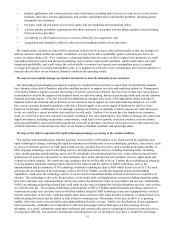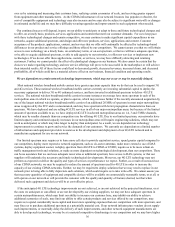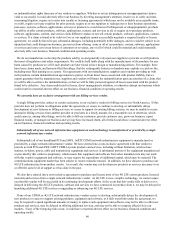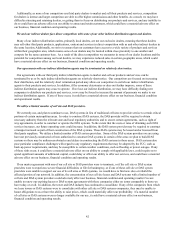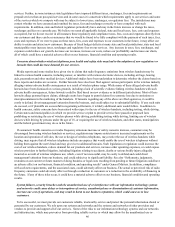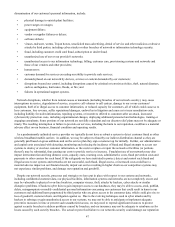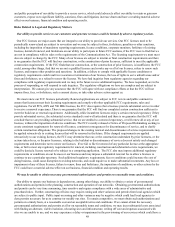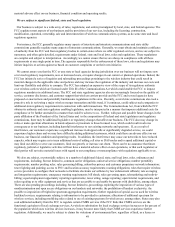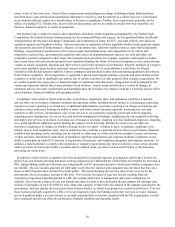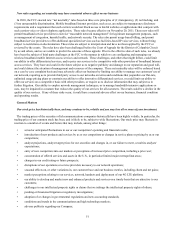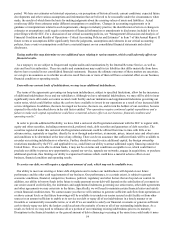Metro PCS 2011 Annual Report Download - page 56
Download and view the complete annual report
Please find page 56 of the 2011 Metro PCS annual report below. You can navigate through the pages in the report by either clicking on the pages listed below, or by using the keyword search tool below to find specific information within the annual report.45
significantly above, the current trading prices of our common stock. We believe that our future success depends in substantial
part on our continued ability to attract and retain highly knowledgeable, qualified executive, technical and management
personnel. We believe that competition for highly qualified management, technical and sales personnel is intense, and there can
be no assurance that we will retain our key management, technical and sales employees, that we will be successful in attracting,
assimilating or retaining other highly qualified management, technical and sales personnel in the future sufficient to support our
continued growth, or that we will be successful in replacing any of our key management, technical and sales personnel that may
retire or cease to be employed by us. We have experienced occasional difficulties in recruiting qualified personnel and there can
be no assurance that we will not experience such difficulties in the future. The departure or retirement of, or our inability to
attract or retain, highly qualified executive, technical and management personnel, including the chief executive officer, could
have a material adverse effect on our business, financial condition and operating results.
We are exposed to counterparty risk in our senior secured credit facility and related interest rate protection agreements.
We have entered into interest rate protection agreements to manage the Company's interest rate risk exposure by fixing a
portion of the interest expense we pay under our senior secured credit facility; however, there can be no assurance that these
will be effective or that we will be able to continue to enter into these agreements at a reasonable cost. There has been
considerable turmoil in the world economy and banking markets, which could affect whether the counterparties to such interest
rate protection agreements are able to honor their agreements. If the counterparties fail to honor their commitments, we could
experience higher interest rates, which could have a material adverse effect on our business, financial condition and operating
results.
The investment of our substantial cash balances are subject to risk.
We can and have historically invested our substantial cash balances in, among other things, securities issued and fully
guaranteed by the United States or any state, highly rated commercial paper and auction rate securities, money market funds
meeting certain criteria, and demand deposits. As a result of uncertainty in the United States political arena, the United States
economy, and the credit and financial markets, together with the potential impact of the failure of the United States government
to raise the United States debt ceiling and the possible downgrade of the United States debt credit rating, the stability of the
trading market for United States government securities and treasury auctions could be adversely impacted or impaired and the
United States government may be unable to satisfy their obligations under any treasury securities we hold. We are also exposed
to risks resulting from the deterioration in the financial condition of financial institutions holding our cash deposits, decisions
of the investment managers of the money market funds and defaults in securities underlying the funds. All our investments are
subject to credit, liquidity, market and interest rate risk. Such risks may result in a loss of liquidity, substantial impairment to
our investments, realization of substantial future losses, or a complete loss of the investment in the long-term, which may have
a material adverse effect on our business, financial condition, operating results and liquidity.
Recent political changes could have an adverse effect on our relationship with our workforce.
None of our employees is covered by a collective bargaining agreement or represented by an employee union. With the
ongoing changes in the party affiliations the party composition of Congress, the President of the United States and the changes
in composition of Federal and state legislatures, legislation or regulatory rules have been proposed and may be enacted which
could impose additional requirements on us or make it easier for union organizing activities. If our employees become
represented by an employee union or are subject to a collective bargaining agreement, it may make it more difficult for us to
manage our business and to attract and retain new employees and may increase our cost of doing business. Having our
employees become represented by an employee union, having a collective bargaining agreement or having additional
requirements related to our employees imposed on us could have a material adverse effect on our business, financial condition
and operating results.
We are subject to numerous taxes, surcharges and fees from federal, state and local governments, and the applicability
and the amount of these taxes, surcharges and fees is subject to great uncertainty.
Telecommunications providers pay a variety of surcharges and fees on their gross revenues from interstate and intrastate
services, including federal Universal Service Fund, or USF, fees and common carrier regulatory fees. Some of these fees are
based on the division of our services between interstate services and intrastate services, including the divisions associated with
the federal USF fees, which is a matter of interpretation and, in the future, may be contested by the FCC or state authorities.
The FCC also may change in the future the basis on which federal USF fees are charged. The FCC may impose other charges
or fees on our business, such as recurring spectrum usage or licensing fees. Many states also apply transaction-based taxes to
sales of our products and services and to our purchases of telecommunications services from various carriers. In addition, state
regulators and local governments have imposed and may in the future impose various surcharges, taxes and fees on our


